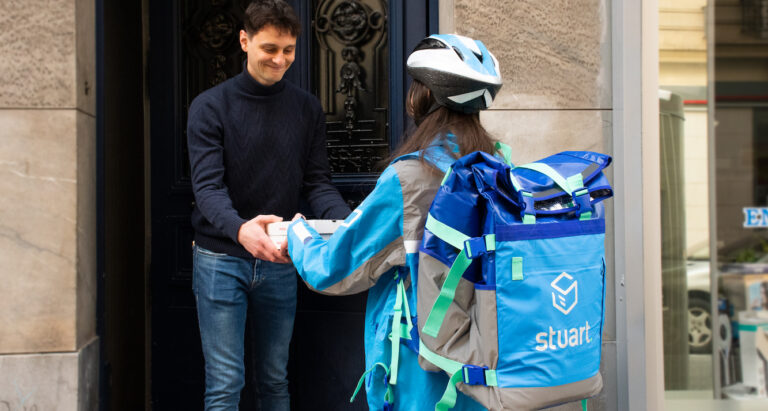While the turbulence caused by COVID-19 impacted all businesses, SMEs arguably felt the full force of the pandemic. Multiple lockdowns, financial pressures and the extended closure of high streets across the country were felt the most acutely by SMEs. However, despite the odds stacked against them, many SMEs, cornerstones of local communities and the economy, have pivoted and evolved to thrive in this new retail landscape.
Three years on, as businesses can welcome shoppers once again, the retail landscape has markedly changed. Rapid delivery, a lifeline to retail businesses during the pandemic, has become part of consumers’ heightened expectations and shows no signs of abating. For most households, online deliveries are the new normal – for the weekly food shop, wardrobe essentials, or the treat of a Friday-night takeaway.
Consumers undoubtedly operate within an increasingly digital economy, and businesses must have a robust  presence online as well as in person. To remain competitive, SMEs must continue to push robust and efficient delivery offers as a part of this, Cornelia Raportaru, CEO of Stuart provides SMEToday’s readers some guidance. Against a backdrop of inflation, stretched supply chains, and a cost-of-living crisis, this challenge becomes ever more urgent and complex. However, taking forward the lessons on resilience built through the pandemic, SMEs have the opportunity to unlock the immense power of last-mile deliveries for their customers and their businesses.
presence online as well as in person. To remain competitive, SMEs must continue to push robust and efficient delivery offers as a part of this, Cornelia Raportaru, CEO of Stuart provides SMEToday’s readers some guidance. Against a backdrop of inflation, stretched supply chains, and a cost-of-living crisis, this challenge becomes ever more urgent and complex. However, taking forward the lessons on resilience built through the pandemic, SMEs have the opportunity to unlock the immense power of last-mile deliveries for their customers and their businesses.
Integrating technology to maintain customer relationships
Delivery services are a key link between the business and the customer, forming a critical part of the overall customer experience. And there is no question that consumer expectations are on the rise. Customers are pushing for enhanced delivery options that balance speed and cost – which can be incredibly challenging for SMEs, with comparably fewer resources and less infrastructure at their disposal than bigger brands. Building in-house delivery capability from scratch is simply not an option for many businesses. It requires significant, up-front investment, recruiting, training and contracting couriers, purchasing and maintaining vehicles and building the in-house systems and infrastructure from the ground up.
The answer for many SMEs is finding the right delivery specialists to partner with. This brings them all the benefits of efficient, established systems to deliver for their consumers without the significant financial implications of building their own fleet. However, it can often be overwhelming for business owners to settle upon the right delivery option for their needs, something we have explored in our latest Food Guide.
In an ever more competitive environment, building a loyal customer base is imperative to a business’ survival. While outsourcing order and delivery management to a food aggregator or marketplace platform may seem like a cost and time-effective solution, it can be hard to keep track of multiple online and in-house orders coming at once on several different devices. Seeing this gap in the market, new technology solutions such as Otter and UrbanPiper have emerged to streamline online orders in a more user-friendly way.
Partnering with the right organisations is absolutely critical for SMEs looking to expand their delivery business. And bad deliveries reflect poorly on the business. According to Deliverect, an overwhelming majority of customers (80%) will blame the vendor, not the delivery service, if their order arrives damaged or late. The delivery experience is intrinsically linked to customer retention and satisfaction. This reputational risk can make many enterprises wary of outsourcing their delivery to a partner.
Leveraging delivery partners needn’t mean relinquishing control, though. With a third-party logistics partner, such as Stuart, restaurants can tap into a roster of independent couriers while maintaining the relationship with the customer. There is also the added benefit of pooling orders, paying just once for delivery, and therefore, cutting costs and increasing profits.
Building sustainable supply chains
The explosion of e-commerce and last-mile delivery services means urban logistics is at a critical turning point. The delivery landscape has embraced technology and automation, replacing ageing infrastructures with flexible, customer-focused solutions. Outdated models have been upgraded to custom delivery options, including same-day and next-day, to meet consumers’ expectations.
However, these expectations are constantly evolving. Recent research from Stuart shows that almost a third (30%) of business representatives believe their customers want more sustainable options for deliveries. This alignment of customer values with their purchasing power means that small businesses must incorporate the environmental delivery practices that their consumers are increasingly demanding.
This represents yet another challenge for small businesses, especially as customers are not always willing to pay a premium for sustainability. However, the landscape is changing for the better. Improved technology is becoming more accessible, and many delivery companies are pivoting to more eco-friendly models. Investing in sustainable solutions and innovations now will shore up businesses for the long term. As companies look to decarbonise, they must choose a delivery model that works for the unique needs of their business, improving efficiency, sustainability and resilience.
The resilience of SMEs
SMEs are the backbone of the economy and underpin the fabric of communities nationwide. According to the World Bank, SMEs represent about 90% of businesses, providing more than 50% of global employment. This makes them essential to building a thriving economy. Increasingly, their survival is dependent on an effective approach to delivery.
There is no one-size-fits-all approach. All SMEs have a unique character and equally unique business needs. It is important that last-mile delivery partners understand and support SMEs to meet their specific objectives. For SMEs looking to harness the benefits of last-mile delivery, remaining future-focused and understanding their unique requirements is essential, as is choosing their partnerships wisely. With the right tools, SMEs will be able to build resilient and sustainable delivery systems that connect them with their customers and adapt to market changes.
When small businesses flourish, so do our local communities and our national economy. We are committed to ensuring that SMEs can thrive in the future, no matter what lies ahead.

